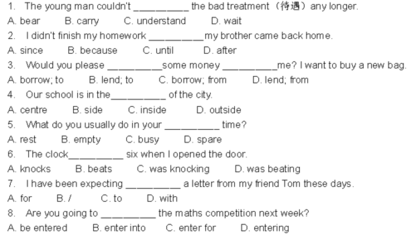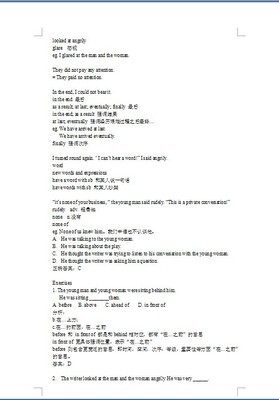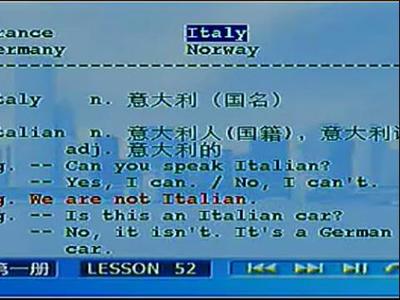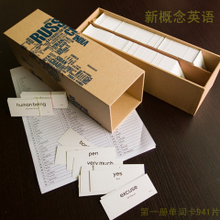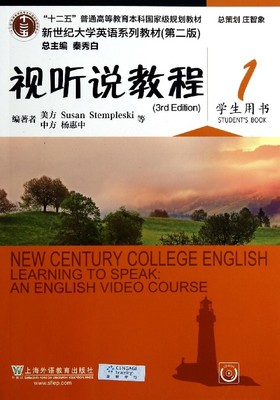Lesson 1 Excuseme!
[词汇](11)
excuse v. 原谅
me pron. 我(宾格)
yes adv. 是的
is v. be动词现在时第三人称单数
this pron. 这
your possessive adjective 你的,你们的
handbag n.(女用)手提包
pardon int. 原谅,请再说一遍
it pron. 它
thankyou 感谢你(们)
verymuch 非常地
★Excuse me.
1、引起对方注意时
2、常用于与陌生人搭话,打断别人的说话或从别人身边挤过,或在某个聚会中突然中途要离开一会儿时
Excuse us for amoment. 对不起,让我们单独聊会。
sorry 对不起,用于对别人有伤害时
★me pron. 我(宾格)
人称代词:
主格
宾格
形容词性物主代词
名词性物主代词
I
me
my
mine
he
him
his
his
she
her
her
hers
it
it
its
its
you
you
your
yours
主格:用在句首,作主语
宾格:在动词、介词之后
形容词性的物主代词:不能单独使用
名词性物主代词:只能单独使用
★is v. be动词现在时第三人称单数
be动词:am、is、are
I am
she/ he/ it is
you/ we/ they are
★pardon int. 原谅,请再说一遍
Pardon?/I beg your pardon. 请求对方把刚才讲过的话重复一遍。
[语法]
含有be动词的陈述句、否定句和一般疑问句
含有be动词的任何句子,否定句就是在be动词后面加not;如果变一般疑问句,就把be动词提前到句子的前面。
[课文]
Excuseme.
Yes?
Isthis your handbag?
Pardon?
Isthis your handbag?
Yes,it is.
Thankyou very much.
Lesson 2 Isthis your…?
[词汇](10)
pen n.钢笔
pencil n.铅笔
book n.书
watch n.手表
coat n.上衣,外衣
dress n.连衣裙
skirt n.裙子
shirt n.衬衣
car n.小汽车
house n.房子
★dress
① n. 连衣裙;套裙
② n. 服装,衣服
casual dress 便服
evening dress 晚礼服
★house n.房子
house 房子,一般指独立的院落,更具体的指房子的建筑,结构
family 侧重家庭的成员
Thereare four people in my family. 在我家里有四口人。
home 抽象的家的概念
homeroad 《我的父亲母亲》
Lesson 3 Sorry,sir.
[词汇](10)
umbrella n.伞
please int.请
here adv.这里
my possessive adjective 我的
ticket n.票
number n.号码
five num.五
sorry adj.对不起的
sir n.先生
cloakroom n.衣帽存放处
★here adv.这里
地点副词:(在英语中,时间副词、地点副词的前面不能加介词)
here 这里 there 那儿
home 家(副词,名词) abroad 国外
downstairs 楼底下 upstairs 楼上
downtown 市中心
★five num.五
one,two,three,four,five,sir,seven,eight,nine,ten
★sir n.先生
① 对不相识的男子、年长者或上级的尊称
What can I do for you, sir? 先生,您要买什么?
② sir通常用于正式信函开头的称呼:
Dear Sir
③ Sir可用于有爵士称号者的名字或姓名前,但不用于姓氏前。
madam:女士,夫人
Mr.:先生
Mrs.:夫人(已婚的)
Miss:小姐,一般用于指末婚女子,不过在不知道对方是否已婚时也可使用(两种发音:[mis] 已婚未婚均可;[miz]即不愿意被称为已婚,又不愿意被称为未婚)
mister:加在男性的姓氏前面
gentleman 绅士,对男性比较有礼貌的称呼,在公众场合最得体的称呼
lady 女士
ladies andgentlemen
Lady first.
guy 在美国英语中对男性一种不正式的称呼,家伙
boy 在美语中不正式的称呼 girl 女孩
male 男性 female 女性
man 男人 woman 妇女
[语法]
祈使句:
祈使句:主语通常不直接表示出来,其谓语动词用原型,也叫无主句。表示命令、请求、建议、叮嘱等。祈使句真正的主语是你,但省略了。
My umbrella and mycoat please. 省略了动词和间接宾语的祈使句。
Keep off thegrass! 请勿践踏草地!
Help yourself! 请自己动手!
某些祈使动词可以后跟and和另一个祈使动词,而不是后跟带to的动词不定式结构。
Come and see thisgoldfish.
Go and buy yourselfa new pair of shoes.
去给自己买双新鞋吧。
Wait and see. 等着瞧吧。
倒装句:
here is 是简单的倒装句,be 动词放在 here 的后面,这个句式就可以成为简单的倒装句式。
My ticket is here. 我的票在这。
Here is my ticket./ Here's my ticket.
[课文]
Mycoat and my umbrella please.
Hereis my ticket.
Thankyou, sir.
Numberfive.
Here'syour umbrella and your coat.
Thisis not my umbrella.
Sorry,sir.
Isthis your umbrella?
No, itisn't.
Isthis it?
Yes,it is.
Thankyou very much.
Lesson 4 Is this your…?
[词汇](5)
suit n.一套衣服
school n.学校
teacher n.老师
son n.儿子
daughter n.女儿
Lesson 5 Niceto meet you.
[词汇](14)
Mr. 先生
good adj.好
morning n.早晨
Miss 小姐
new adj.新的
student n.学生
French adj.&n.法国人
German adj.&n.德国人
nice adj.美好的
meet v.遇见
Japanese adj.&n.日本人
Korean adj.&n.韩国人
Chinese adj&n.中国人
too adv.也
★nice adj.美好的
① adj. 美好的,好看的
It’s a nice day today,isn’t it?
② adj. 和蔼的,友好的
He is very nice to hisneighbours.
③ adj. 使人高兴的,令人愉快的
It is so nice to haveyou here.
[语法]
冠词:
冠词数量上表示“一个”。冠词一共有三个,分为不定冠词和定冠词。
1、a,an 是不定冠词:可数名词单数前面必须要用不定冠词
a 用在以辅音音素开头的名词前面, an 用于以元音音素(元音发音的单词)开头的名词前面
a pen an apple an umbrella an egg an hour auniversity
2、the是定冠词,表示特指,有两种发音:[TE]、[Ti:],以元音发音开头的单词前面读[Ti:]。当想使听话者特别注意the后面的名词时,the就读为[Ti:],意思是“这一个而且只是这一个”或“主要是这一个”。
定冠词的用法:
① 特指名词(即以说话人或听话人已知的人或物为前提)时,用the
There is an apple on the desk. Theapple is mine.
Well, there is a girl in front ofthe classroom. The girl is my sister.
② 在专有特殊名词时,用the
the Great Wall,the Summer Palace,the Forbidden City(紫禁城),the sun
③ 在国家前不用冠词,特例国家除外
the United States of America
[课文]
MR.BLAKE: Good morning.
STUDENTS: Good morning, Mr. Blake.
MR.BLAKE: Thisis Miss Sophie Dupont.
Sophieis a new student. She is French.
MR.BLAKE: Sophie,this is Hans. He is German.
HANS: Nice to meet you.
MR.BLAKE: Andthis is Naoko. She's Japanese.
NAOKO: Niceto meet you.
MR.BLAKE: Andthis is Chang-woo. He's Korean.
CHANG-WOO: Nice to meet you.
MR.BLAKE: Andthis is Luming. He is Chinese.
LUMNG: Niceto meet you.
MR.BLAKE: And this is Xiaohui. She'sChinese, too.
XIAOHUI: Niceto meet you.
[课文注释]
1、英语国家中的姓名通常由三部分组成:名+中间名+姓。一般不用中间姓,在熟人之间以名相称,正式场合用Mr.、Mrs.、Miss(小姐)或Ms.(女士)加姓相称。
2、Nice to meet you.
用于初次与同学、朋友见面等非正式的场合,一般回答Nice to meet you, too.
正式场合常用How do you do?回答也是How do you do?
Lesson 6 Whatmake is it?
[词汇](13)
make n.(产品)牌号
Swedish adj.瑞典的
English adj.英国的
American adj.美国的
Italian adj.意大利的
Volvo [5vClvEJ] n.沃尔沃(Swedish)
Peugeot n.标致(French)
Mercedes[5mE:sidi:z] n.梅赛德斯(German)
Toyota n.丰田(Japanese)
Daewoo n.大宇(Korean)
Mini n.迷你(English)
Ford n.福特(American)
Fiat [fiEt, 5fi:At] n.菲亚特(Italian)
★make n.(产品的)牌子;类型,型号;式样
What make is your watch?
Her dress is of Italian make. 她的连衣裙是意大利式的
★English adj. 英国(人)的;英格兰(人)的;英国化的
John is very English. 约翰生活行事非常英国化。
[语法]
选择疑问句:
选择疑问句:在两者或三者中进行选择,用特殊颖问词or进行连接。选择疑问句词调一般是前升后降,选择疑问句的回答必须要用完整的句子回答。
Is she a Chinese teacher or aJapanese teacher?
She isn't a Chinese teacher. She'sa Japanese teacher.
Lesson 7 Areyou a teacher?
[词汇](10)
I pron. 我
am v. be动词现在时的第一人称单数
are v. be动词现在时复数
name n. 名字
what adj.& pron. 什么
nationality n. 国籍
job n. 工作
keyboard n. 电脑键盘
operator n. 操作人员
engineer n. 工程师
★nationality n. 国籍
nation n. 国家
national adj. 国家的,民族的
nationality n. 国籍
person n. 人
personal adj. 个人的
personality n. 人品人格
★job[dVCb] n. 工作
① n. 职业,工作,有报酬的工作,既可以是体力的,也可以是脑力的
What is your job?
② n. (一件)工作,话计
The wholejob takes about 40 minutes.
③ n. 职责
It’s yourjob to be on time.
work [wE:k] n. 工作,广义的概念,泛指的劳动
working class 工人阶级
★keyboard n. 电脑键盘
key [ki:] n. 钥匙
board [bC:d] n. 木板
blackboard n. 黑板
★operator n. 操作人员
-or 字母组合,表示某种人 actor n. 男演员
[语法]
特殊疑问句:
特殊疑问句=特殊疑问词+一般疑问句
特殊疑问词:what、where、who 、when、which、why、whom、how、how many、howmuch、how long、how far、howoften、how soon
what可以用来询问名字、国籍、工作、颜色、型号等:
What make is it? 它是什么牌子?
What color is it? 它是什么颜色的?
What nationality…?
What time is it?
What size is this skirt?
一般疑问句:
Be动词+…
Do/Does/Did+…
Have/Has/Had+…
Can及情态动词(must、need、may…)
1、所有一般疑问句必须要用升调来读
2、一般疑问句可以用简单的Yes/No来回答
3、所有一般疑问句用什么来问的就用什么来答
[课文]
ROBERT: I am a new student.
My name's Robert.
SOPHIE: Nice to meet you. My name's Sophie.
ROBERT: Are you French?
SOPHIE: Yes, I am.
Are you French, too?
ROBERT: No, I am not.
SOPHIE: What nationality are you?
ROBERT: I'm Italian.
Are you a teacher?
SOPHIE: No, I'm not.
ROBERT: What's your job?
SOPHIE: I'm a keyboard operator.
What's your job?
ROBERT: I'm an engineer.
[课文注解]
1、Are you French,too?
too和either两个词都表示“也”的意思,too用于肯定句和疑问句中,either仅限用于否定句中。too和either一般放在句末,且前面通常用逗号隔开。
2、Wha nationalityare you?
用于询问对方国藉,相当于Where are you from?或Where do you come from?
3、What’s your job?
询问对方从事何种职业也可以说:What do you do?
Lesson 8 What's your job?
[词汇](10)
policeman [pE5li:smEn] n.警察
policewoman [pE`li:s9wJmEn] n.女警察
taxidriver [5tAksi-5draivE] n.出租汽车司机
airhostess [ZE-5hEustEs] n.空中小姐
postman [5pEJstmEn] n.邮递员
nurse [nE:s] n.护士
mechanic [mi5kAnik] n.机械师
hairdresser [5heEdresE] n.理发师
housewife [5haJswaif] n.家庭妇女
milkman [5milkmEn] n.送牛奶的人
★nurse [nE:s] n. 护士
① n. 护士;照料者
② v. 照料;照看
All her time goes into nursing herchild.
她把全部时间都花于照看自己的孩子上了。
③ v. 养护;培养
nurse a young tree 养护树苗
nurse an author of promise 培养有前途的作家
Lesson 9 Howare you today?
[词汇](9)
hello int. 喂(表示问候)
hi int. 喂,嗨
how adv. 怎样
today adv. 今天
well adj. 身体好
fine adj. 美好的
thanks int. 谢谢
goodbye int. 再见
see v. 见
★how adv. 怎样
How about that? 怎么会这样?那一个怎么样?
How come?=Why? 为什么?
How goes it? = How is itgoing? 事情进展如何?
★fine adj. 美好的
① 健康的;舒适的
② 极好的,优秀的
a fine view 美好的景色
③ 优雅的,雅致的
He is a man with finemanners. 他是一个举止优雅的男人。
★see v. 见
see 表示看见的结果
look 表示看的动作
look at sth. look out of the window look into my eyes
watch 观看移动的一些东西 watch TV
[语法]
How …?的一些社交上的用法:
1、用于询问健康状况或一般生活情况:
How are you? /How have youbeen? 你一向可好?
2、Howdo you do ?是正式介绍中的一句套话,从不用来询问健康。
3、How经常用在询问目前状况的疑问句里:
How’s life? 生活如何?
How are things? 情况怎样?
How’s work? 工作怎么样?
形容词的意义与作用:
1、形容词修饰名词所指的人、物等,说明人、物等是什么样或看上去是什么样的。
2、许多形容词可用以回答What’s…like?这样的问题,并可根据上下文给出笼统或确切的信息。
What’s Tom like? He’s very fat.
3、英语中形容词作定语时一般置于名词之前。
[课文]
STEVEN: Hello, Helen.
HELEN: Hi, Steven.
STEVEN: How are you today?
HELEN: I'm very well, thank you. And you?
STEVEN: I'm fine, thanks.
How is Tony?
HELEN: He's fine, thanks.
How's Emma?
STEVEN: She's very well, too, Helen.
Goodbye, Helen. Nice to see you.
HELEN: Nice to see you, too, Steven.
Goodbye.
Lesson 10 Look at…
[词汇](13)
fat adj. 胖的
woman n. 女人
thin adj. 瘦的
tall adj. 高的
short adj. 矮的
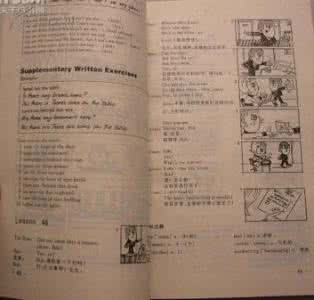
dirty adj. 脏的
clean adj. 干净的
hot adj. 热的
cold adj. 冷的
old adj. 老的
young adj. 年轻的
busy adj. 忙的
lazy adj. 懒的
★look
① 看,瞧,观,望
Look carefully before you crossthe street.
过马路前要仔细看清来往车辆。
②面向,朝向
The room looks on the sea. 房间面向大海。
Two windows look to the south. 两扇窗子朝南。
Lesson 11 Isthis your shirt?
[词汇](5)
whose pron. 谁的
blue adj. 蓝色的
perhaps adv. 大概
white adj. 白色的
catch v. 抓住
★whose pron. 谁的
whose(特殊疑问词):用于询问所有关系。对形容词性物主代词、名词性物主代词、名词所有格的两种情况(形容词性和名词性)进行提问。
★blue adj. 蓝色的
① 蓝色的,蔚蓝的
② 沮丧的,忧郁的
His mood is blue. 他的情绪低落。
He looks a bit blue. 他看上去有点儿忧郁。
★catch v. 抓住
① v. 接住,拦住
② v. 逮住,捕获 catch a thief
③ v. 染上(疾病)
I have caught a bad cold. 我得了重感冒。
[语法]
所有格形容词和所有格代词:
所有格形容词与所有格代词都表示所有,即某人或某物属于某一个人,回答以whose引导的问句。所有格形容词my、your等是限定词,必须始终放在名词之前,只能作定语,它们的形式取决于所有者,而不是被拥有的东西。所有格代词mine、yours等不能用在名词前,并且在说话时要加重语气,它们指人或物,单数或复数都一样,在句中作主语、宾语、表语用。
I have my way, and she has hers.
名词所有格:
名词所有格与名词有关(与所有格形容词和所有格代词有关),名词+’s:表示……的,如:Tim's、Jones'、boss's。
名词所有格有两种属性:形容词性、名词性
This is Tim's shirt. (形容词性)
This shirt is Tim's. (名词性)
[课文]
TEACHER: Whose shirt is that?
Is this your shirt, Dave?
DAVE: No.Sir. It's not my shirt.
This is my shirt. My shirt'sblue.
TEACHER: Is this shirt Tim's?
DAVE: Perhapsit is, sir. Tim's shirt's white.
TEACHER: Tim!
TIM: Yes,sir?
TEACHER: Is this your shirt?
TIM: Yes,sir.
TEACHER: Here you are. Catch!
TIM: Thankyou, sir.
[课文注解]
Hereyou are. 给你
这是给对方东西时的用语,也可用Here it is.或Here they are.(指复数的物)。句中的are和is一般应重读。
Lesson 12 Whose is this…? This is my/your/his/her…
Whose is that…? That is my/your/his/her…
[词汇](8)
father n. 父亲
mother n. 母亲
blouse n. 女衬衫
sister n. 姐,妹
tie n. 领带
brother n. 兄,弟
his possessive adjective. 他的
her possessive adjective. 她的
Lesson 13 Anew dress
[词汇](8)
colour n. 颜色=color(美)
green adj. 绿色
come v. 来
upstairs adj. 楼上
smart adj. 时髦的,巧妙的
hat n. 帽子
same adj. 相同的
lovely adj. 可爱的
★colour n. 颜色=color(美)
what colour is…?
What make is …? 什么车牌?
★come v. 来
come on:快点来;拜托,得了吧;过来
Comeon. I’m not 18 years old again. 拜托,得了吧。
go:去,加油
★smart adj. 时髦的,巧妙的
① 漂亮的,时髦的,巧妙的
You look smart in thatnew dress.
② 聪明的,伶俐的,精明的
He is a smartbusinessman.
[课文]
LOUISE: What colour's your new dress?
ANNA: It'sgreen.
Come upstairs and see it.
LOUISE: Thank you.
ANNA: Look! Here it is!
LOUISE: That's a nice dress.
It'svery smart.
ANNA: My hat's new, too.
LOUISE: What colour is it?
ANNA: It'sthe same colour.
It'sgreen, too.
LOUISE: That is a lovely hat!
[课文注释]
It’sthe same colour. 一样的颜色。
same通常与定冠词the连用,表示“同一的”、“相同的”
twoboys of the same age 两个同龄的男孩子
Lesson 14 What colour's your…?
[词汇](3)
case n. 箱子
carpet n. 地毯
dog n. 狗
Lesson 15 Yourpassport, please.
[词汇](9)
customs n. 海关
officer n. 官员
girl n. 女孩,姑娘
Danish adj.& n. 丹麦人
friend n. 朋友
Norwegian adj.& n. 挪威人
passport n. 护照
brown adj. 棕色的
tourist [5tuErist] n.旅游者
★customs n. 海关
customs,Customs n. [复]海关;征收关税的程序
The spy was stopped at the Customsand questioned.
那个间谍在海关被截住并被加以盘问。
custom n. 风俗,习惯
When risiting a foreign country,we might find the country’s customs strange to us.
It is his custom to go for a walkin the evening.
★friend n. 朋友
friend:朋友(正式)
pal:好友,伙伴(随意)
buddy:伙伴,朋友(随意)
friendship:友谊
A friend in need isa friend indeed. 患难之交才是真朋友。
★tourist n. 旅游者
tour n. 观光,旅游
tour guide 导游
travel n. 旅行(泛指)
traveler n. 旅行者
trip v.&n. 旅行(短途)
[语法]
名词:
名词有五种:
1、普通名词(可数名词):a pen、a book
2、物质名词(不可数名词):water、milk
3、专有名词:Mt. Tai(泰山)、the Great Wall(长城)、Summer Palace(颐和园)
4、集体名词:police、people、family
5、抽象名词:beauty、wisdom
可数名词单数变复数的规则:
1、普通的名词后边直接加 s
a book/ two books
加 -s 后的读音[s] [z] [iz]
2、以辅音字母加 y 结尾的单词要把 y 变i 加 es
baby -> babies
3、以-ch -sh -x -s -z 结尾的单词要加 -es 读音为[iz]
4、以f 或 fe 结尾的单词要变为 ves
knife -> knives wife -> wives
5、辅音字母加 o 结尾的单词要加 es
potato -> potatoes zoo -> zoos
元音字母加 o 结尾的单词要加 s
6、英语中有一些名词的复数形式是不规则的
man——men swoman——women
milkman——milkmen policwwman——policwomen
[课文]
CUSTOMSOFFICER: Are you Swedish?
GIRLS: No,we are not. We are Danish.
CUSTOMSOFFICER: Are your friends Danish, too?
GIRLS: No,they aren't.
They are Norwegian.
CUSTOMSOFFICER: Your passports, please.
GIRLS: Herethey are.
CUSTOMSOFFICER: Are these your cases?
GIRLS: No,they aren't.
Our casesare brown.
Here they are.
CUSTOMSOFFICER: Are you tourists?
GIRLS: Yes,we are.
CUSTOMSOFFICER: Are your friends tourists too?
GIRLS: Yes,they are.
CUSTOMSOFFICER: That's fine.
GIRLS: Thankyou very much.
Lesson 16 Are you…?
[词汇](8)
Russian adj.&n. 俄罗斯人
Dutch adj.&n. 荷兰人
these pron. 这些(复数)
red adj. 红色的
grey adj. 灰色的
yellow adj. 黄色的
black adj.黑色的
orange adj. 橘黄色的
★grey adj. 灰色的
① 灰色的,偏灰的
② 头发灰白的
Her hair is grey.
③ 面色苍白的
Tony looks grey and tired. 托尼面色苍白,显得疲惫。
[语法]
名词复数--s或-es的发音规则:
① 如果名词词尾的发音是一个清辅音([s]、[F]、[tF]除外),-s发[s]的音
如:books [buks] suits[su:ts]
② 如果名词词尾的发音是一个浊辅音([z]、[V]、[dV]除外)或元音,-s发[z]的音,
③ 如果名词词尾的发音是[s]、[z]、[F]、[V]、[tF]、[dV],-s发[iz]的音
Lesson 17 How do you do?
[词汇](6)
employee n. 雇员
hard-working adj. 勤奋的
salesreps 推销员=salesrepresentatives
man n. 男人
office n. 办公室
assistant n. 助手
★employee n. 雇员
一个动词后有 -ee,是被这个动作影响的人;一个动词后有 -er,是做出这个动作的人。
V+-ee 被……的人
V+er 发出……的人
employ v. 雇拥
I need to employ some people tohelp me do this work.
employee n. 雇员
employer n. 雇主
employment n. 工作
-ment 名词后缀
train v. 训练
trainee n. 被训练的人
trainer n. 训练者
★hard-working adj. 勤奋的
hard adj&adv. 艰苦的,坚硬的,努力地
work n&v. 工作
hard-working adj. 勤奋的
Lucy is a hard-working employee.
They are hard-working.
hard-work n. 艰苦的工作
This is a hard-work.
work hard 努力地工作
★assistant n. 助手
officeassistant 指办公室干杂务的工作人员
assist v. 援助
[课文]
MR.JACKSON: Come and meet our employees,Mr. Richards.
MR.RICHARDS: Thank you, Mr. Jackson.
MR.JACKSON: This is Nicola Grey, and thisis Claire Taylor.
MR.RICHARDS: How do you do?
Those women are veryhard-working.
Whatare their jobs?
MR.JACKSON: They're keyboard operators.
This is MichaelBaker, and this is Jeremy Short.
MR.RICHARDS: How do you do?
They aren't verybusy!
Whatare their jobs?
MR.JACKSON: They're sales reps.
They'revery lazy.
MR.RICHARDS: Who is this young man?
MR.JACKSON: This is Jim.
He'sour office assistant.
Lesson 18 What are their jobs?
twenty thirty forty fifty sixty seventy eighty ninety
one/a hundred one/a thousand
百位和十位之间用and连接。
1万=10千
101:one hundred and one
1564:onethousand five hundred and sixty four
9059:ninethousand and fifty nine
63,152:sixty three thousand one hundred and fiftytwo
331,278:three hundred and thirty one thousand twohundred and seventy eight
Lesson 19 Tiredand thirty
[词汇](9)
matter n. 事情
children n. 孩子们 (child 的复数)
tired adj. 累,疲乏
boy n. 男孩
thirsty adj. 渴
Mum n. 妈妈
sitdown 坐下
right adj. 好,可以
icecream 冰淇淋(有时可数,有时不可数)
★matter n. 事情
① n. 事情,事件
It’s a private matter.
He’s not very interested infinancial matters.
② n. 麻烦事,困难
What's the matter? =Tell me what’swrong? =What’s wrong?
What’s the matter with+sb.
What's the matter with thechildren?
It doesn't matter. 没关系
It matters. 有关系
Does it matter? 有关系吗?可以吗?
★thirsty adj. 渴
① adj. 渴的,口干的
② adj. (工地等)干旱的
a dry and thirsty land 干旱的土地
③ adj. 渴望的,渴求的(for / after)
The students there are thirsty forknowledge.
那里的学生有强烈的求知欲。
[语法]
There be 句型
there be 句型:表示某处有某物
there is + 可数名词的单数/不可数名词
There is a pen, two books and aknife on the desk.
课桌上有一枝钢笔、两本书和一把小刀。(第一个并列名词是单数,所以用is)
there are + 可数名词的复数形式
常见方位介词:in、on、over、under
on:在…上面,接触物体表面
over:越过,垂直上方,不接触表面
in:在…里面,物体里面
to:往,向,表示去向方向
into:进入…里面,从外到里进入的过程
out of:在…外,从里面出来
across:横穿[在物体表面横穿],从平面穿过
through:从里面(中间)穿过
under:在……下面
deside:在……旁边
near:在……附近
between:在……两者之间
among 在…中间(两者以上)
over:从斜面穿过
介词用法:
1、 跟在be动词之后
2、 跟在一些不及物动词之后
[课文]
MOTHER: What's the matter, children?
GIRL: We'retired …
BOY: … andthirsty, Mum.
MOTHER: Sit down here.
Are you all right now?
BOY: No,we aren't.
MOTHER: Look!
There'san ice cream man.
MOTHER: Two ice cream please.
Here you are, children.
CHILDREN: Thanks, Mum.
GIRL: Theseice creams are nice.
MOTHER: Are you all right now?
CHILDREN: Yes, we are, thank you!
Lesson 20 Look at them!
[词汇](10)
big adj. 大的
small adj. 小的
open adj. 开着的
shut adj. 关着的
light adj. 轻的
heavy adj. 重的
long adj. 长的
shoe n. 鞋子
grandfather n. 祖父
grandmother n. 祖母
Lesson 21 Whichbook?
[词汇](3)
give v. 给
one pron. 一个
which 哪一个
[语法]
动词的双宾语:
buy me a book=buy a book for me
Give me a book.=Give a book to me.
双宾语中通常物是直接宾语,人是间接宾语
[课文]
MAN: Giveme a book please, Jane.
WOMAN: Which book? This one?
MAN: No,not that one.
The red one.
WOMAN: This one?
MAN: Yes,please.
WOMAN: Here you are.
MAN: Thankyou.
Lesson 22 Give me/him/her/us/them a …
Which one?
[词汇](14)
empty adj. 空的
full adj. 满的
large adj. 大的
little adj. 小的
sharp adj. 尖的,锋利的
blunt adj. 钝的
box(boxes) n. 盒子,箱子
glass(glasses) n. 杯子
cup(cups) n. 茶杯
bottle(bottles) n. 瓶子
tin(tins) n. 罐头
knife(knives) n. 刀子
fork(forks) n. 叉子
spoon(spoons) n. 勺子
★large adj. 大的
★big adj. 大的
large仅指物理量值的大,主要指体积、面积、形状、数量方面的大,修饰人时指个子大。small的反义词。
Look atthat large woman in white.
big所表示的大,主要指不仅体积大而且很重,在修饰人时,主要指大人物,但个子未必高大。
She’svery big in the filmdom.
她在电影界中是个响当当的人物。(指不仅成功,而且具有很大的影响力)
★little adj. 小的
★small adj. 小的
small指物理量值的小或少,是large的反义词,不带什么感情色彩。
I wantthe small one with the yellow handle.
little也表示小或少,但有小而可爱的感情色彩,是big的反义词。
She hasthe sweetest little smiles.
★glass n. 杯子
①n. 玻璃杯或有脚的玻璃杯
②n. 杯中物,酒
He hashad a glass too much. 他多喝了一杯(喝醉了)。
I’dlike to enjoy a glass now and then. 我喜欢不时喝点酒。
★cup n. 杯子
① n. 杯子(一般带柄,用于盛热饮或咖啡)
I have a beautiful set of teacups.
② n. 一杯饮料,一杯咖啡
You can get a good cup at Lucy’s Café.
Lesson 23 Whichglasses?
[词汇](2)
on prep. 在……之上
shelf n. 架子,搁板 on theshelf
[语法]
定语:
定语:是修饰限定的成份,做定语的词一般是形容词,但也可用介词短语或定语从句做定语。
介词短语做后置定语:
a book on the desk
定语从句:
This is the boy I saw yesterday.
在英语中,形容词修饰名词时,修饰成份放在名词前面,但由一个介词短语或句子修饰名词时,这个修饰成份应放在名词的后面。
[课文]
MAN: Giveme some glasses please, Jane.
WOMAN: Which glasses?
These glasses?
MAN: No,not those.
Theones on the shelf.
WOMAN: These?
MAN: Yes,please.
WOMAN: Here you are.
MAN: Thanks.
Lesson 24 Giveme/him/her/us/them some…
[词汇](12)
desk n. 课桌
table n. 桌子
plate n. 盘子
cupboard n. 食橱
cigarette n. 香烟
television n. 电视机
floor n. 地板 on thefloor
dressingtable n. 梳妆台
magazine n. 杂志
bed n. 床
newspaper n. 报纸
stereo n. 立体声音响
★desk n. 课桌
★table n. 桌子
desk通常指有抽屉的桌子,用于办公、读书、写字等,即“书桌”、“写字台”、“办公桌”
He is working at his desk. 他正在自己的书桌前用功。
table通常指由若干条腿支撑着的平板,没有抽屉,即“餐桌”、“会议桌”、“工作台”、“手术台”等。
I’ve booked a table for two at7.00.
They sat round the talbe and madethis big decision.
他们围坐在会议桌旁,作出了这个重大的决定。
Lesson 25 Mrs.Smith's Kitchen
[词汇](10)
Mrs. 夫人
kitchen n. 厨房
refrigerator n. 电冰箱
right n. 右边
electric adj. 带电的,可通电的
left n. 左边
cooker n. 炉子,炊具
middle n. 中间
of prep.(属于)……的
room n. 房间
★cooker n. 炉子,炊具
在英文中炊事员用cook。
[课文]
Mrs.Smith's kitchen is small.
Thereis a refrigerator in the kitchen.
Therefrigerator is white.
It ison the right.
Thereis an electric cooker in the kitchen.
Thecooker is blue.
It ison the left.
Thereis a table in the middle of the room.
Thereis a bottle on the table.
Thebottle is empty.
Thereis a cup on the table, too.
Thecup is clean.
Lesson 26 Whereis it?
[词汇](2)
where adv. 在哪里
in prep. 在…里
Lesson 27 Mrs.Smith's living room
[词汇](7)
livingroom 客厅
near prep. 靠近
widow n. 窗户
armchair n. 扶手椅
door n. 门 near thedoor
picture n. 图画
wall n. 墙 on the wall
★living room 客厅
living 生活
★near prep. 靠近
①adj. 靠近的,接近的
②adj. 关系接近的,亲近的
She isnear frined of mine.
Myuncle is nearest relation.
③adj. 近似的,几乎的
Thepicture may not be an exact replica but its pretty near.
这幅画也许不是一模一样的复制品,但是已酷似原作了。
★widow n. 窗户
win 赢
wind 吹风
★armchair n. 扶手椅
chairman 主席
president n. 总统
[语法]
some, any 一些:
some 和 any 跟可数名词的复数或者是不可数名词;
some表示“某些但不是全部”,通常用于肯定句中,在表示征求对方意见,并且希望得到肯定的答复时也可以用于疑问句。
Have you got some paper-clips inthat box? (回形针)
Would you like something to drink?你想喝点什么吗?
any表示不确定的数量,通常用在含有not或-n’t的否定句中,也用于表示不确定答案是肯定还是否定,或用于预料得到的回答是No的疑问句。
[课文]
Mrs.Smith's living room is large.
Thereis a television in the room.
Thetelevision is near the window.
Thereare some magazines on the television.
Thereis a table in the room.
Thereare some newspapers on the table.
Thereare some armchairs in the room.
Thearmchairs are near the table.
Thereis a stereo in the room.
Thestereo is near the door.
Thereare some books on the stereo.
Thereare some pictures in the room.
Thepictures are on the wall.
Lesson 28 Where are they?
[词汇](1)
trousers n. 长裤
Lesson 29 Come in, Amy?
[词汇](11)
shut v. 关门
bedroom n. 卧室
untidy adj. 乱,不整齐
must modal verb 必须,应该
open v. 打开
air v. 使 … 通风,换换空气
put v. 放置
clothes n. 衣服
wardrobe [5wC:drEub] n.大衣柜
dust v. 掸掉灰尘土
sweep v. 扫
★untidy adj. 乱,不整齐
un-前缀,表示否定;tity adj. 整齐的,干净的
happy——unhappy 不幸福的
lucky——unlucky 不幸的
known——unknown 未知的
★air v. 使 … 通风,换换空气
① n. 空气,新鲜空气
Let’s go out andbreathe some fresh air.
② n. 空中,空间
He likes to stay inthe open air. 他喜欢在户外呆着。
③ v. 晾(衣服、被褥等);使通风
Leave the trouserson the washing-line to air.
把裤子挂到晾衣绳上去晾干。
★dust v. 掸掉灰尘土
★sweep v. 用笤帚扫地
dust ① v. 掸掉……上的灰尘;② n. 灰尘
clear adj. 清晰的 v. 清除
clean adj. 清洁的,干净的 v. 使……干净(不管用什么方法)
cleanse v. 用水彻底把……弄干净
wipe v. 用抹布去擦
[语法]
情态动词:
1 情态动词表示人的情感、状态或情绪变化的一种助动词,它本身具有实际意义。
2 情态动词不能单独做谓语,只能和后面的原形动词一起构成谓语。
3 情态动词没有人称和数格的变化。
4 含有情态动词的句子,否定句在它后面加not,一般疑问句把它提前。
情态动词must的用法:
must是情态动词,表示“必须”、“应当”,与have to相似,表示不可逃避的义务。在说话人看来,没有选择的余地。但must带有个人色彩,表示说话人的主观意图。表示个人感情时通常用must。
You must…(你必须……)表示说话人说/认为……是必要的。
You must open the window.
You mustn't open the window?
Must I open the window?
Yes, you must.
No, you needn't.
[课文]
MRS.JONES: Come in, Amy.
Shut the door, please.
MRS.JONES: This bedroom's very untidy.
AMY: Whatmust I do, Mrs. Jones?
MRS.JONES: Open the window and air the room.
Then put these clothesin the wardrobe.
MRS.JONES: Then make the bed.
MRS.JONES: Dust the dressing table.
Then sweep the floor.
Lesson 30 Whatmust I do?
[词汇](7)
empty v. 倒空,使…变空
read v. 读
sharpen v. 削尖,使锋利
put on 穿上
takeoff 脱掉
turn on 开(电灯)
turnoff 关(电灯)
★empty adj. 空的
① v. 使空;把……倒出(移出)
They emptied the house. 他们把房屋搬空了。
② v. 流出;走出
The river emptied itself into the sea. 河水流入大海。
It was raining, and the streets began to empty.
天下起了雨,街上的行人开始稀少了。
③ adj. 空的
Her purse is empty. 她的钱包是空的。
④ adj. 空虚的,无意义的
It’s an empty dream. 这是个不现实的梦想。
Officials were flattered by empty complements.
官员们被空洞的恭维话弄得心里美滋滋的。
⑤ adj. 呆板的,毫无表情的
She looked at him with empty eyes. 她木然地看着他。
He said all this in an empty voice.
他用一种呆板声调说了这一切。
Lesson 31 Where'sSally?
[词汇](10)
garden n. 花园
under prep. 在……这下
tree n. 树
climb v. 爬,攀登
who pron. 谁
run v. 跑
grass n. 草,草地
after prep. 在……之后
across prep. 横过,穿过
cat n. 猫
★climb v. 爬,攀登
① v. 攀登,攀爬(树、山等)
②v. 逐步上升(增长)
The temperature is climbing steadily. 温度正在慢慢地平稳上升。
The price of gold climbed back. 金价逐渐回升了。
③v. (在社会地位等方面)往上爬
He is trying hard to climb to the top of the social ladder.
他正努力爬到社会的最顶层。
He has climbed to a very high position in his field.
他已在自己的领域中爬到了一个很高的位置。
★run v. 跑
① v. 跑,奔跑
run across the grass:跑过草地
② v. 流动;流出
Thecurrent is running strong. 水流湍急。
Her eyesran with tears. 她落泪了。
③ v. 追赶;追逐;追求
run after:追逐
Many young men are running afterthat girl.
许多年轻人在追求那个姑娘。
[语法]
时态:共十六种时态,时态是通过动词变化来实现的。
学习方法:
1 首先了解概念
2 时态——动词变化规则、时间的状态
现在进行时:
1、概念
①表示现在正在进行或者发生的动作或事情
②表示现阶段正在进行或发生,但说话的此刻动作不一定进行
③可以表示将来(多用于移动性动词,并且后面要加将来的时间)
移动性动词:go /come /return /move
2、结构:
肯定句:S. + be + v.-ing
否定句:S. + be + not + v.-ing
一般疑问句:Be + S. + v.-ing ?
回答:Yes, S. + be/ No, S. + be + not
特殊疑问句:What + be + S. + v.-ing?
3、动词变化:V-ing
4、时间:now
[课文]
JEAN: Where's Sally, Jack?
JACK: She's in the garden, Jean.
JEAN: What's she doing?
JACK: She's sitting under the tree.
JEAN: Is Tim in the garden, too?
JACK: Yes, he is.
He'sclimbing the tree.
JEAN: I beg your pardon?
Who'sclimbing the tree?
JACK: Tim is.
JEAN: What about the dog?
JACK: The dog's in the garden, too.
It'srunning across the grass.
It'srunning after a cat.
Lesson 32 What's he/she/it doing?
[词汇](12)
type v. 打字
letter n. 信
basket n. 篮子
eat v. 吃
bone n. 骨头
clean v. 清洗
tooth n. (复数 teeth)牙齿
cook v. 做(饭菜)
milk n. 牛奶
meal n. 饭,一顿饭
drink v. 喝
tap n. (水)龙头
★cook v. 做(饭菜)
① v. 烹调;煮,烧
She cooked a lovely meal for herhusband.
The beef is not cooked enough. 牛肉煮得不够熟。
② n. 厨子,炊事员
Tom works as a cook in a localrestaurant.
My dad is really a good cook.
Lesson 33 Afine day
[词汇](15)
day n.日子
cloud n.云
sky n. 天空 in the sky
sun n. 太阳
shine v. 照耀 sunshine
with prep. 和……在一起
family n. 家庭(成员)
walk v. 走路, 步行
over prep.跨越,在……之上
bridge n. 桥
boat n. 船
river n. 河
ship n. 轮船
aeroplane n. 飞机
fly v. 飞
★day n.日子
Sunday:[5sQndi]星期天
Monday:星期一
Tuesday星期二
Wednesday:星期三
Thursday:星期四
Friday:星期五
Saturday:星期六
★with prep. 和……在一起
be with:和……在一起
Mrs.Liu is with those children.
★walk v. 走路, 步行
walk over:走过
They are walking over the bridge.
on foot 步行(介词短语)
They are going to school on foot.
★boat n. 船
★ship n. 轮船
boat指河中行驶的小船,ship一般指海洋中行驶的大船。
★aeroplane n. 飞机
飞机正式用语:aeroplane(英语)、airplane(美语);
非正式用语:plane
[课文]
It isa fine day today.
Thereare some clouds in the sky, but the sun is shining.
Mr.Jones is with his family.
Theyare walking over the bridge.
Thereare some boats on the river.
Mr. Jonesand his wife are looking at them.
Sallyis looking at a big ship.
Theship is going under the bridge.
Tim islooking at an aeroplane.
Theaeroplane is flying over the river.
[课文注释]
Mr.Jones is with his family.
句中with是介词,表示“和……一起”。family指“家里的人”或“家庭成员”。
Lesson 34 Whatare they doing?
[词汇](6)
sleep v. 睡觉
shave v. 刮脸
cry v. 哭,喊
wash v. 洗
wait v. 等
jump v. 跳
★sleep v. 睡觉
① v. 睡觉
I was so excited that I couldhardly sleep.
② n. 睡眠;睡觉
He had a good sleep last night.
★jump v. 跳
① v. 跳跃;跃过
They jumped off the wall and ranoff. 他们从墙上跳下去跑掉了。
② v. 略去;跳过
He jumped the first grade incollege.
他跳过大学一年级(指跳级直接升入二年级)。
③ v. 突然上升;猛增
They jumped the registration feesfrom 20 to 50.
他们把注册费从20涨到50。
His company’s profits jumpedsurprisingly last year.
他所在公司去年的利润令人惊异地飞速增加。
[语法]
动词+ing的规则:
1、一般的词直接加-ing:read——reading
2、以-e结尾,要去掉-e,然后再加-ing:shave——shaving
以-ee结尾,直接加-ing:see——seeing
3、重读闭音节结尾的单词,末尾如果只有一个辅音字母,双写辅音字母,然后再加-ing:sit——sitting
重读闭音节:一般单音节都为重读
闭音节:五个元音字母在单词里,发本身的字母音是开音节,如果不是发本身的字母音就是闭音节。
4、一般双音节重读音节必须在第二个音节,第二个音节里有一个元音和辅音的单词要双写,加ing。
enter——entering;refer——referring
Lesson 35 Ourvillage
[词汇](14)
photograph n. 照片
village n. 村庄
valley n. 山谷
between prep. 在……之间
hill n. 小山
another det. 另一个
wife n. 妻子
along prep. 沿着
bank n. 河岸
water n. 水
swim v. 游泳
building n. 大楼,建筑物
park n. 公园
into prep.进入
★photograph n. 照片
I want to take a photo.
picture 照片(美)
take a photograph/ picture ofsb. 给某人拍照
“……的”用of,无生命的东西表示所属
a photograph of a city/ ourvillage
★hill n. 小山
hill:不高的小山丘
mount:名山,山的专有名词
mountain:大型的,高山
range:山区,山脉,连绵起伏的群山
★water n. 水(不可数名词)
waters 水域
★swim v. 游泳
go swimming 去游泳
★park n. 公园 v. 停车
No parking. 不许停车
[语法]
短语动词:
短语动词通常是指后面常跟一个介词或副词短语的动词,即动词+介词或副词小品词。英语(特别是非正式的、惯用的英语)中存在着一种用动词短语代替与其同义的单个动词的强烈趋势。最常见的短语动词是由英语中最短小和最简单的动词构成的,这些动词常与表示位置或方向的词组合,如along,down,in,off,on,out,over,under等。而且一个短语本身也可能有几种不同的意义。
★go into
① 走进;进入
② 进入;介入
They’re going into the businessworld. 他们正步入商界。
★sit on
① 坐在……上
② 拖延(口语);压下
They are trying to sit on the badnews as long as possible.
他们正试图尽可能拖延时间不把这个坏消息讲出去。
★runalong
① 沿着……跑
The dogs are running along theriver banks.
② 离开;走开
It’s getting dark, we must runalong. 天黑了,我们得走了。
[课文]
Thisis a photograph of our village.
Ourvillage is in a valley.
It isbetween two hills.
Thevillage is on a river.
Hereis another photograph of the village.
Mywife and I are walking along the banks of the river.
We areon the left.
Thereis a boy in the water.
He isswimming across the river.
Hereis another photograph.
Thisis the school building.
It isbeside a park.
Thepark is on the right.
Somechildren are coming out of the building.
Someof them are going into the park.
Lesson 36 Where…?
[词汇](2)
beside prep. 在……旁
off prep. 离开
Lesson 37 Making abookcase
[词汇](8)
work v. 工作
hard adv. 努力地
make v. 做
bookcase n. 书橱,书架
hammer n. 锤子
paint v. 上漆,涂
pink n.& adj. 粉红色
favourite adj. 最喜欢的
★work v. 工作
① v. 工作;劳动
Heworks 45 hours per week.
② v. 从事职业
Heworks as a bank clerk.
③ v. 学习;做作业
Ifyou work hard, you’ll pass your exams.
④ n. 工作;劳动;作业;职业
Heis without work. 他失业了。
Hewants to have a good sleep after a day’s work.
★bookcase 书橱,书架
bookshelf 书架 bookseller 书商
bookshop 书店(英) bookstore 书店(美)
bookmark 书签 bookwarm 书虫
mark:考试分数,标记
★ paint v. 上漆,涂
① v. 上漆,涂
② v. (用颜料)画
Who painted this picture?
③ v. 描写;描绘
His novel paints a peacefulpicture of the country life in Europe.
他的小说描绘了有关欧洲乡村生活的的宁静画面。
④ n. 油漆;涂料;颜料
Wet Paint! 油漆末干!
I bought a box of paints. 我买了一盒颜料。
painter 画家,油漆工
writer 作家,抄字工
painting 画
picture 画片(总称)
cartoon 卡通图画
sketch 草图
drawing 铅笔画,素描
★pink n.& adj. 粉红色
in the pink 健康
pink-collar 粉领的,职业妇女的 white-collar 白领的
blue-collar 蓝领的 golden-collar 金领
pink lady 红粉佳人
pink slip 解雇通知书
[语法]
be going to 句型
含义:
1、打算、准备在最近做某事(在非正式语体中,一般多用be going to,而不用will)
2、表示按计划、安排要发生的事
3、表示预言即将要发生某事
结构:
陈述句:am/is/are +going to+V原
We are going to make a bookcase.
She is going to cry.
It is going to rain.
疑问句:将助动词be提至句首变为一般疑问句。
否定句:在助动词后面加上not可以变为否定句。
宾语补足语:
I am going to paint it pink.
We call him ‘little fatty’.
want sb. to do sth. 想要某人做某事
for:为……(befor)
to:(方向)去……
[课文]
DAN: You're working hard, George.
Whatare you doing?
GEORGE: I'm making a bookcase.
Give me that hammer please,Dan.
DAN: Whichhammer? This one?
GEORGE: No, not that one. The big one.
DAN: Hereyou are.
GEORGE: Thanks, Dan.
DAN: Whatare you going to do now, George?
GEORGE: I'm going to paint it.
DAN: Whatcolour are you going to pain it?
GEORGE: I'm going to paint it pink.
DAN: Pink!
GEORGE: This bookcase isn't for me.
It's for my daughter, Susan.
Pink'sher favourite colour.
Lesson 38 What are you going todo?
What are youdoing now?
[词汇](3)
homework n. 作业
listen v. 听
dish n. 盘子,碟子
★homework n. 作业
do one’shomework 做家庭作业
housework 家务活
do thehousework 做家务活
homeland 祖国 homemade 家里自制的
homesick 思乡 lovesick 相思
hometown 家乡
★listen vi. 听(表示听的动作)
listen to 听某人讲话
Listen to the music!
hear vt. 听见(表示结果)
Can you hear me?
hear of 听说
I have heard of this story a lot.
hear from sb. 收到某人来信
vt. 及物动词:后边直接跟宾语
vi. 不及物动词:不可直接跟宾语,必须加了介词才可以跟宾语
★dish n. 盘子,碟子
a homely dish 一道家常菜
plate 盘子
Lesson 39 Don't drop it!
[词汇](6)
front n. 前面
infront of 在……之前
careful adj. 小心的,仔细的
vase [vB:z] n. 花瓶
drop v. 掉下
flower n. 花
★front n. 前面;adj. 前面的
front line 前排,前线
front page news 头版新闻
★in front of 在……前面
in front of 在……前面(不属于同一范围)
There is a garden in front of thebuilding.
The vase is in front of you.
in the front of 在……前部(属于同一范围)
There is a blackboard in the frontof the classroom.
★careful adj. 小心的,仔细的
care n. 照料,照顾;v. 关心,顾虑,照顾
take care of =look after 照顾某人
You must take care of (look after)her.
medical care 医疗护理
special care 特殊护理
skin care 皮肤护理
hair and skin care
I don’t care. 我不在乎
Who cares? 谁管他,管他呢
careful adj. 仔细的
careless adj. 粗心的
carefully adv 仔细的
Lucy is a careful girl. /Lucy iscareful.
Be careful! 小心点
Look out! 小心,当心
Mind yourself! 小心一点儿!
Mind your own business. 管好你自己的事。
Watch your step! 小心滑倒
★drop v. 掉下
① v. (失手)落下;掉下;放下
She dropped her knife and fork andhurried to answer the phone.
她放下刀叉赶紧去接电话。
② v. (使)滴下;滴水
Tears dropped from her face.
③ v. (使)下降;降低
He dropped his voice.
Yesterday the temperature droppedto 8 below zero.
[语法]
祈使句
1、普通动词原形+其它(名词或代词)
Help yourself! 请自己动手。
Keep off the grass! 请勿践踏草地!
2、be动词 + 形容词
Be quiet!
祈使句的否定形式是在其前边加 Don't.
Don't be silly!
某些祈使动词可以后跟and和另一个祈使动词,而不是带to的动词不定式结构。
Wait and see. 等着瞧吧。
Go and buy yourself a new pair ofshoes.
do的用法
① 助动词:to do with
② 实义动词:Don't do that.
[课文]
SAM: What are you going to do with thatvase, Penny?
PENNY: I'm going to put it on this table, Sam.
SAM: Don't do that. Give it to me.
PENNY: What are you going to do with it?
SAM: I'm going to put it here, in front ofthe window.
PENNY: Be careful! Don't drop it!
Don't put it there, Sam.
Putit here, on this shelf.
SAM: There we are!
It'sa lovely vase.
PENNY: Those flowers are lovely, too.
Lesson 40 What are you going todo?
I'm going to …
[词汇](3)
show v. 给……看
send v. 送给
take v. 带给
★send v. 送给
① v. 送给;寄
I’ll send him a present.
② v. 差遗;命(请)……去
He sent his secretary for adoctor.
Her mother often sends her to thestore for some groceries.
[语法]
词组:动词+介词
put on 穿上 take off 脱下
动词加介词的词组,再加名词,名词可以放中间,也可以放后边;而如果是动词加代词的词组,则只能放中间。
Put your coat on! = Put on yourcoat!
Put it on!
 爱华网
爱华网